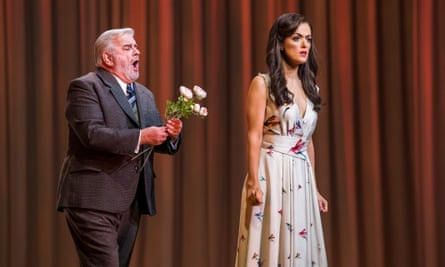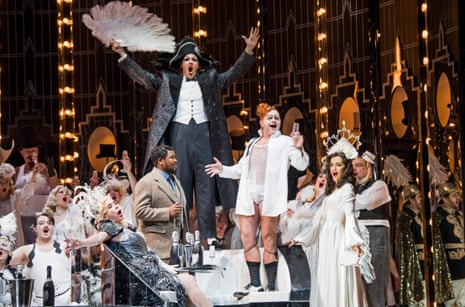There was a noise in the auditorium when the curtain went up on English National Opera’s new La Traviata: the sound of 4,000 eyebrows being raised simultaneously. Daniel Kramer’s production is his first here since taking over as the company’s artistic director, and it certainly makes a big impression.
First staged in Basel last November, and designed by Lizzie Clachan (sets) and Esther Bialas (costumes), it opens with the kind of eyeful that UK opera-house budgets aren’t meant to stretch to any more: a big, glitzy party scene, with shiny walls stretching floor to ceiling. It might be a black-and-white ball in a very specialised nightclub. Lots of vaguely Edwardian men, having left their top hats in nifty lockers at the back, are in their vaguely Edwardian underwear, energetically engaging in variously camp forms of debauchery with a stageful of tarts on a stageful of playground equipment: a trampoline, a bucking bronco, a roundabout with chic white lights. That’s our first sight of the ever-reliable ENO chorus, and well done them.
Into the midst of this stumbles Alfredo, a tweedy innocent whose reaction to Violetta’s improbable admission of love is to jump up and down like a happy toddler. Questions about how exactly these two have managed to meet – at all, ever – are enough to last through the first interval. When we come back, it’s a different show. All the glitz has been swept away: the stage is bare except for a circle of grass, some flowers and a bed that initially swings heavily in the air like Foucault’s pendulum. Now the smitten Alfredo and his consumptive lover are almost plausible. With the next scene, however, we’re back to partyland and to caricature, this time with a Day of the Dead theme.

The final act, with a now-skeletal Violetta digging her own grave, might have worked well as the endpoint of a more focused show, and a blindingly good cast might have distracted from the lack of subtlety in Kramer’s direction. Not this one. Claudia Boyle has a beautifully silky soprano and floats some lovely phrases, but her Violetta sounds fatally small-scale in this huge theatre, especially since the sets do nothing to help the voices project forwards; her words are indecipherable. Lukhanyo Moyake makes his UK debut as Alfredo, and in his best moments sings with a voice that is really quite special – a don’t-make-em-like-that-any-more Italian-style tenor. But those moments come and go, and his acting is amiably wooden. Still, given that Kramer’s ideas include Alfredo doing a cringeworthy puppy impression every time he and Violetta get amorous, I doubt Olivier himself could have made this version of the character work.
It’s up to the baritone Alan Opie, whose performance as Alfredo’s authoritarian father celebrates 50 years with ENO, to inject some true vocal class, and to fly the flag for the idea that singing opera in English – ENO’s USP – is a good thing, even in a translation as clunky as this one. And Leo McFall, another first-timer with the company, conducts a lovingly shaped performance from the ENO orchestra, bringing out details in this score you don’t often hear. Those are the two real plus points of this big old mess of a production. The rest of it just doesn’t add up.

Comments (…)
Sign in or create your Guardian account to join the discussion